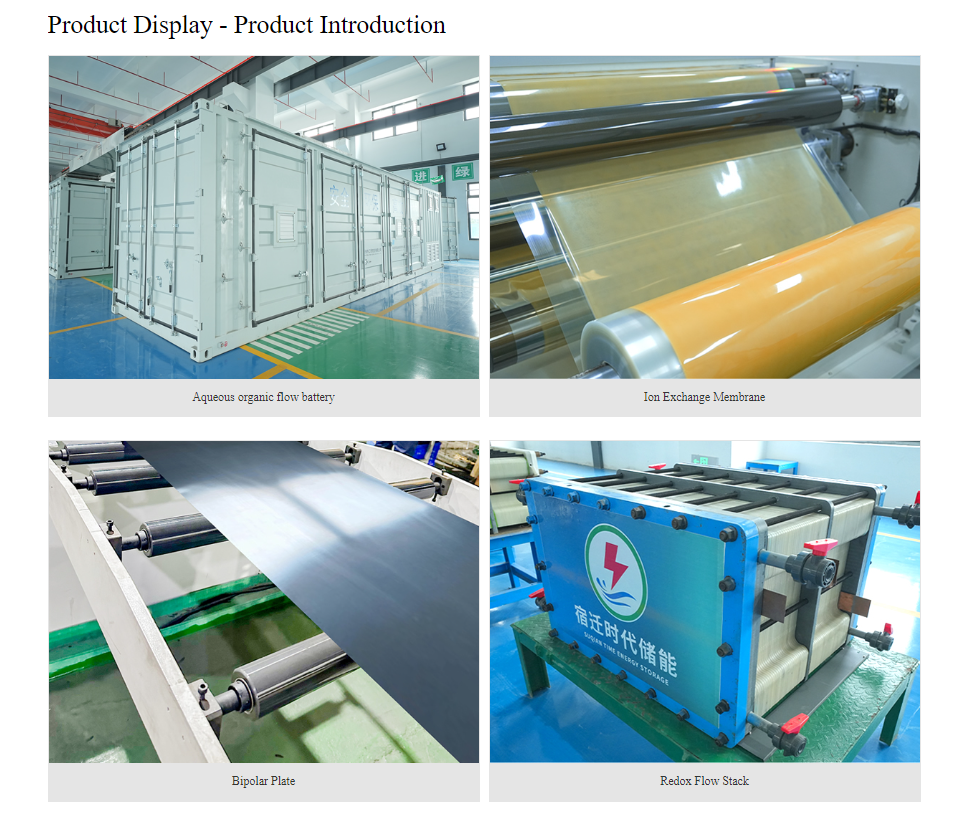Flow batteries utilize liquid electrolytes for electricity storage. However, they have environmental, safety, and cost concerns due to their reliance on heavy metals and strong acids. Organic flow batteries address these issues with a safer, eco-friendly approach, employing carbon-based materials in their electrolytes for energy storage.
The market for organic flow batteries is at a nascent stage. Yet, it has rapid growth potential as the world demands cleaner, more adaptable energy storage solutions. This can be witnessed by the increasing number of startups working on organic flow battery technology. 40% of startups entering the energy storage and battery in the last two years have organic flow battery technology as their primary or secondary focus area.
After analyzing 53 companies (a few out of our exhaustive list of energy storage and solar companies) working on flow battery technology and collating data from 7+ reliable resources, this report enlists five growing startups with organic flow batteries as a primary focus area.
Talk to our experts and get access to the complete list of companies working on the tech by clicking the button below.
The report includes information like technological breakthroughs, application domains, and funding insights to highlight the impact and growth potential of these startups in the energy storage industry.
1. Suqian Times Energy Storage
| Founding Year | 2021 |
| Headquarter | Suqian, Jiangsu, China |
| Total Funding Amount | 100 Million |
| Last Funding Round/Amount | Series A/100 Million |
| Website | https://www.energydefender.cn |
Chinese startup Time Energy Storage, Based in Suqian, specializes in aqueous organic flow batteries (AOFBs) that focus on high energy efficiency and safety. The company initiated full-scale production of its first megawatt-level AOFB in October 2023.
Its organic flow battery technology uses water-soluble organic substances as electrolytes, aiming for over 85% energy efficiency. Another product this startup offers is Anion exchange membranes (AEMs) with positive electric fields to attract OH- ions for low resistance, high mechanical strength, and high selectivity.

The team has filed for over 40 core patents and includes over 70 R&D personnel, including Yang Zhengjin, a Ph.D. holder from USTC as chief scientist, and Xiang Zhanfeng as deputy general manager. It has a research collaboration with the University of Science and Technology of China, Xi’an Jiaotong University, and Changzhou University to develop organic flow batteries and components.
Times Energy Storage has raised $100M in funding over 1 Series A round on Oct 23, 2023. It is funded by four investors, with GL Ventures LLC as the lead investor.
2. Flux XII
| Founding Year | 2021 |
| Headquarter | Wisconsin, US |
| Total Funding Amount | Publicly Not Disclosed |
| Last Funding Round/Amount | Grant/Publicly Not Disclosed |
| Website | https://www.flux12.com/ |
Flux XII is a Madison, Wisconsin-based startup that focuses on developing innovative flow battery technology using organic redox materials and ion-exchange membranes for grid energy storage systems.
The startup develops energy storage technology using synthetically engineered organic molecules for cost-effective, safe flow batteries. Their solutions are sustainable and adaptable for clean energy needs and utilize low-cost methods and pH-neutral water for long-duration grid storage.

Its small team includes three Co-inventors and co-founders: Patrick Sullivan (CEO), Prof. Xiuliang Lyu (SA), and Dr. Dawei Feng (CSO).
It is financially backed up by the Accelerator/Incubator National Science Foundation (NSF) Innovation Corps and Discovery to Product Overview. The last grant received by this startup was in July 2022.
Read more about energy storage industry companies, challenges, and advantages.
3. Quino Energy
| Founding Year | 2021 |
| Headquarter | San Leandro, California, US |
| Total Funding Amount | $9.1 Million |
| Last Funding Round/Amount | Seed/$1.3 Million |
| Website | https://www.flux12.com/ |
Based in San Leandro, CA, this startup has advanced redox flow battery technology utilizing quinones for water-based flow batteries to address the need for longer-duration grid storage.
Quinones: Organic compounds formally derived from aromatic compounds like benzene or naphthalene, such as benzoquinones, naphthoquinones, anthraquinones, and polycyclic quinones.
The company prefers quinones for organic flow batteries for their high water solubility and stability. Key features of their organic flow batteries include no hydrogen gas during charging and renewal quinones in batteries through mild oxidation. These features make the product’s lifecycle longer (without external inert gas protection). Quino’s organic flow batteries are based on technology licensed from Harvard University’s research.
The company was among the top 10 most promising startups and class 2 in the 19th annual Rice Alliance Energy Tech Venture Forum in 2022. It has raised a total of $9.1 million in three funding rounds. The latest funding was $1.3 million raised in Feb 2023 from a Seed round. TechEnergy Ventures, Energy Revolution Ventures, and Doral Energy-Tech Ventures are three investors in this round. The US Department of Energy and Tokyo-based ANRI are the other two investors backing this startup.
The team supporting this startup includes some of the industry’s most intelligent minds, including its CEO Eugene Beh and CTO Meisam Bahari. Both are postdoctoral fellows from Harvard University.
Stay ahead of your competitors with knowledge of the latest industry insights delivered to your inbox by subscribing to the GreyB newsletter.
4. CarbeniumTec Holdings, Inc. OR CarbeniumTec
| Founding Year | 2020 |
| Headquarter | Tucson, Arizona, US |
| Total Funding Amount | Publicly Not Disclosed |
| Last Funding Round/Amount | Publicly Not Disclosed |
| Website | https://www.carbeniumtec.com/ |
This Arizona-based startup focuses on organic redox flow batteries for efficient, sustainable energy storage. It offers a metal-free, non-toxic organic flow battery with a fast charging rate, high cyclability, and low-cost synthetics & membranes. The company’s technology includes a symmetric system with a single organic material working as anolyte and catholyte to improve the organic RFBs’ performance, cycle life, and energy density. Its technology is researched and patented with the help of Arizona University.
CarbeniumTec is located at the UA Tech Park via the Arizona Center for Innovation (UACI) and earned a spot by winning the UACI Sponsored Launch (Fueled by Perkins Coie LLP) contest. This victory granted the startup a year of sponsored admission to the innovation center.
While participating in the 2023 Destination Startup® Showcase, the company mentioned that its technology is currently at a Technology Readiness Level (TRL) of 3/4 with proof of concept, laboratory validation, and testing of the prototype. Its team comprises three genius-minded founders: Dr. Jules Moutet, Dr. Philip Lacovara, and Prof. Thomas Gianetti.
This startup is backed by NFS Innovation Corps (Accelerator/Incubator) and Arizona State University.
5. BioZen Batteries
| Founding Year | 2020 |
| Headquarter | Santa Barbara, California, US |
| Total Funding Amount | Publicly Not Disclosed |
| Last Funding Round/Amount | Seed/Publicly Not Disclosed |
| Website | https://biozenbatteries.com/ |
It is a startup in the UCSB I&E community (Santa Barbara, CA) and a CNSI Technology Incubator member. The company was founded by Ph.D. scientists, including CEO Nate Kirchhofer, in 2019 in the Goleta Load Pocket (GLP), Santa Barbara.
BioZen is developing an innovative, carbon-based “redoxloyte” for redox flow batteries. This (patent-pending) green-plant-inspired technology enhances energy storage affordability and efficiency on the grid.
The company also hosts an Amazon podcast, Beyond Lithium, in which representatives from notable companies—Lockheed Martin Energy Storage, CapyBara Energy, Gates & Cooper LLP, and Terabase Energy—discuss the energy industry’s challenges and opportunities. The podcast showcases the startup’s potential and network value.
The startup is funded by Los Angeles Cleantech Incubator and has raised 1 seed round in January 2021. Battery Council International (BCI) also supports the company. It received a $150,000 CalSEED grant for clean energy innovation.
Other Notable startups in our list that are making waves in the Flow Battery industry are:
The field of organic flow batteries is brimming with innovation, and these are just a handful of the many exciting startups pushing the boundaries. As research and development continue, we can expect even more advancements in this promising technology, like Advanced Molecular Engineering, Sulfonated PIM Membranes, Spirobifluorene-based PIM Polymers, and rejuvenating of decomposing organic molecules like “zombie quinones.”
Contact our experts to learn more about these and the other latest organic flow battery startups or technologies.
Authored By – Naveen Kumar, Market Research











